Curriculum
Our accredited two-year fellowship program is designed to give fellows wide exposure to the practice of both clinical infectious diseases and research techniques in infectious diseases.
Successful trainees will be prepared to pass the ABIM exam to become board-certified in infectious diseases.
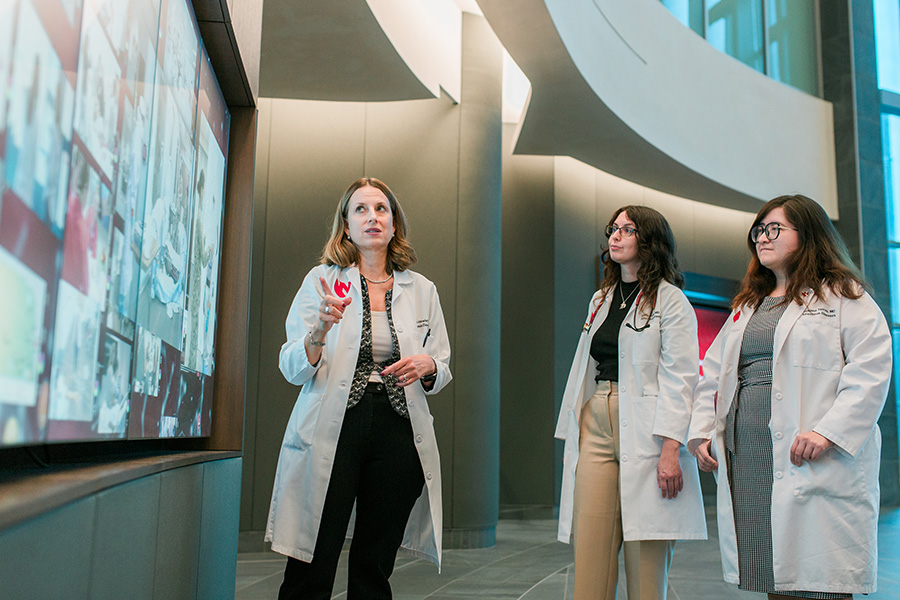
Our fellows learn from our expert faculty in state-of-the-art facilities like the Global Center for Health Security.
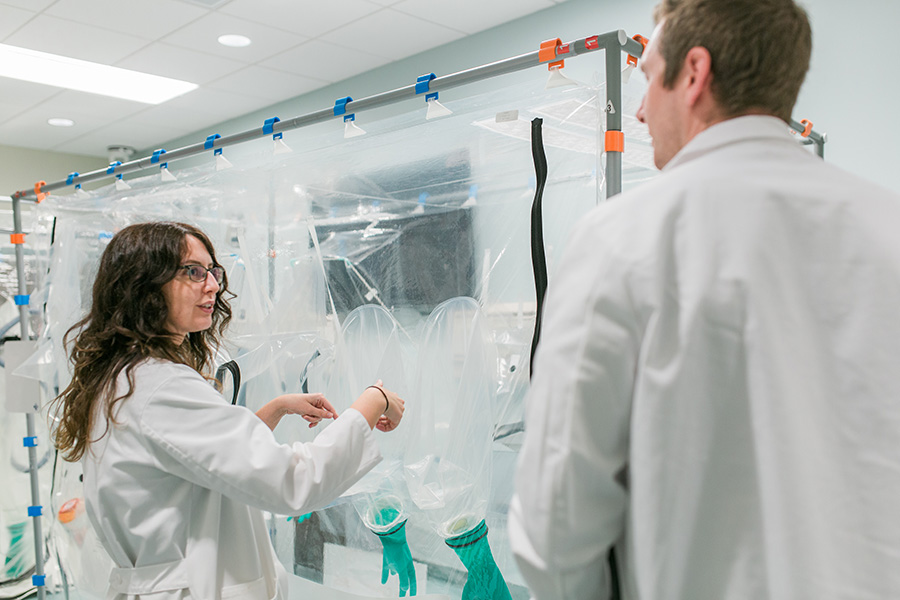
UNMC's experience in biopreparedness and the Nebraska Biocontainment Unit affords our fellows a unique learning experience.
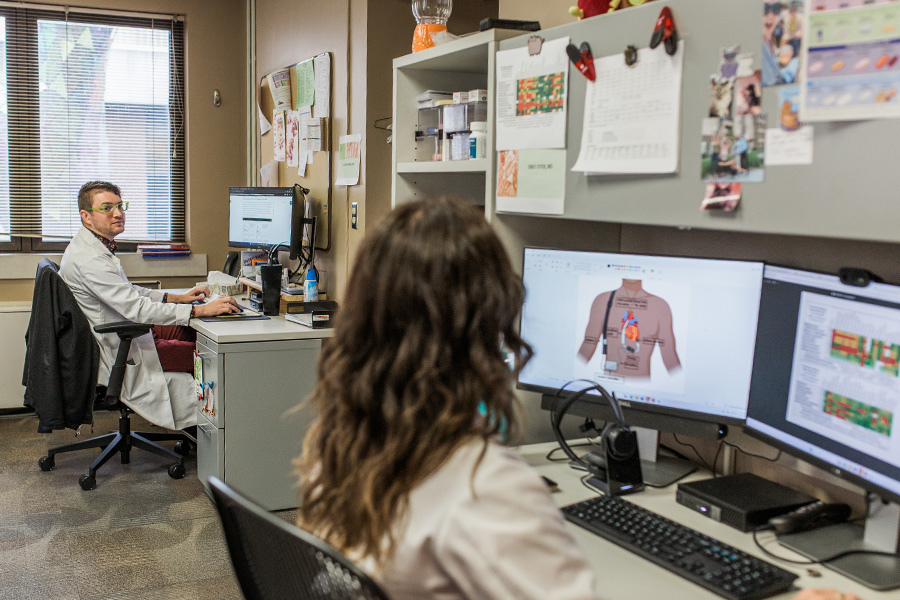
Collaboration is encouraged throughout our two-year fellowship program and fellows are able to work together in a shared space.
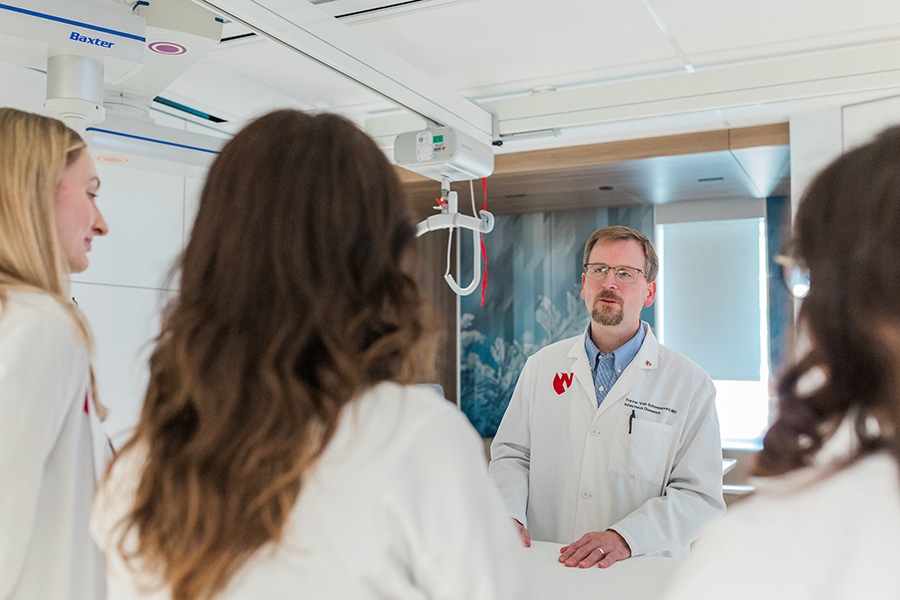
UNMC's location draws patients from the Omaha metro area as well as the less-populated surrounding region ensuring our fellows see a variety of cases.
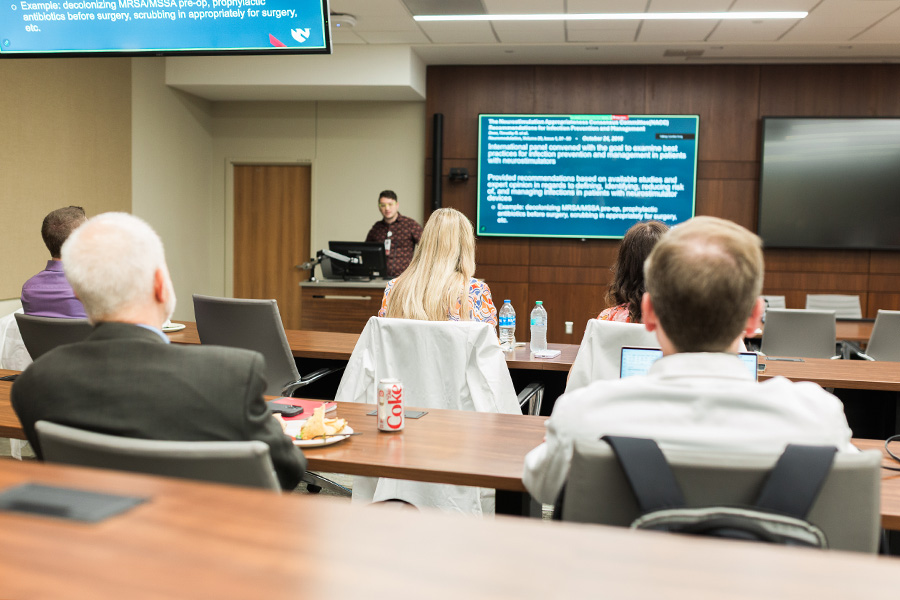
Our fellows are encouraged to pursue research and other scholarly activity. They are given dedicated time to pursue their interests and our faculty support their efforts.
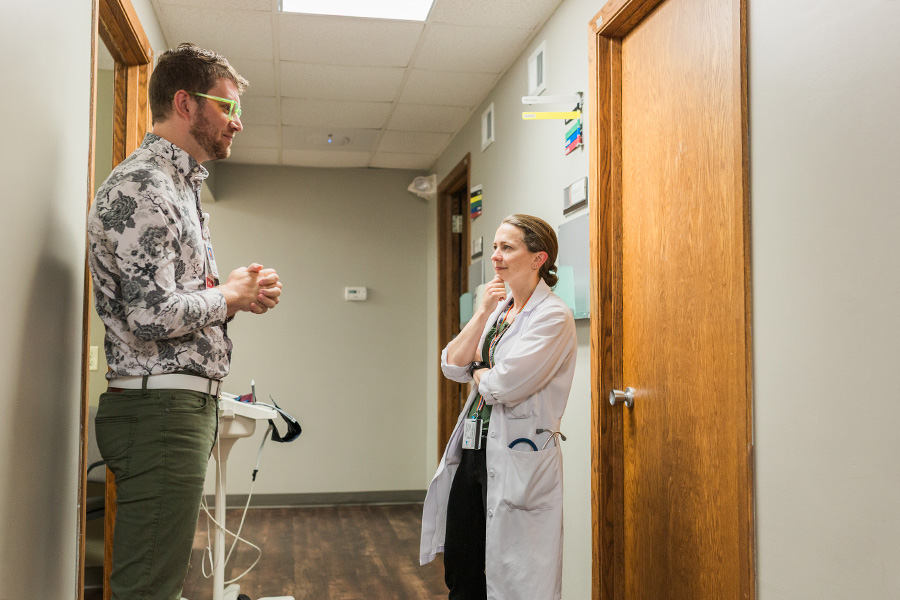
Fellows see their own patient panel at the Specialty Care Clinic, which serves those infected with HIV at all stages of the disease.
Schedule
The first year of our fellowship focuses on acquiring clinical proficiency in both inpatient and outpatient aspects of care. The second year is increasingly focused on research activities with continued training in managing continuity of care in the outpatient setting and infectious disease electives.
- Clinical Microbiology (one month)
- General Infectious Diseases Services (five to six months)
- Orthopedic Infectious Disease Service (one month)
- Transplant and Oncology Infectious Disease Services (two to three months)
- Research (two months)
- General and Orthopedic Infectious Diseases Services (two to three months)
- Transplant and Oncology Infectious Disease Services (three months)
- Electives (two to four months) – includes required Infection Control/Antimicrobial Stewardship and Outpatient Infectious Disease one-month rotations
- Research (four to six months)
- Pediatric Infectious Diseases (up to one month)
- General ID Service: Fellows on General ID manage a variety of complex General ID problems including endocarditis, infections in the ICU, post-operative infections, complicated skin and soft tissue infection, highly drug-resistant infections, and other unusual clinical syndromes. Fellows on General ID work with Internal Medicine residents, medical students, and other trainees serving as the team leader.
- Orthopedic ID Service: Fellows spend the month evaluating and managing patients with bone and joint infections including complex osteomyelitis, prosthetic joint infection, and septic arthritis. They work closely with the orthopedic surgery team to jointly manage these complex infections. Faculty with expertise in Orthopedic ID supervise fellows and they work with a team of physicians and APPs.
- Oncology ID Service: Fellows evaluate and manage infections in patients with bone marrow transplant, hematologic malignancy, and other oncology problems. Faculty with expertise in oncology ID supervise fellows and they work with a team of physicians and APPs.
- Solid Organ Transplant ID Service: Fellows develop their abilities in evaluating and managing patients with all forms of solid organ transplant (heart, lung, liver, kidney, small bowel, pancreas, multivisceral) as well as cardiac device infections (LVAD, ECMO, artificial heart, etc.). Faculty with expertise in transplant ID supervise fellows and they work with a team of physicians and APPs.
- Community ID Service (Bellevue Medical Center): Fellows rotate at a smaller community hospital and are afforded significant autonomy as they work one on one time with an ID faculty member. The patient mix includes both traditional General ID as well as a significant proportion of orthopedic ID infections.
- Other ID Services:
- General ID 2/Step Down Service: Provides care for patients after the primary ID team signs off. It also takes overflow consults from the General ID team. Fellows may occasionally rotate on this service.
- Telehealth Service: Provides live and asynchronous telehealth-based care for patients in smaller hospitals in distant locales. Fellows will spend a few days becoming familiar with telehealth delivery.
- Pediatric ID Service: The Division of Pediatric ID hosts adult ID fellows for two- and four-week electives on request.
- HIV Continuity Clinic: Weekly clinic at the Specialty Care Center located at 52nd and Leavenworth. Fellows will spend a half day per week seeing patients with or at risk for HIV/AIDS. They will have their own panel of patients which they follow throughout the two years of their fellowship.
- General Infectious Disease Clinic: Weekly clinic in the Durham Outpatient Center including a mix of new consults from the outpatient setting and follow up visits for recently discharged inpatients. Fellows attend weekly for four months in year one.
- Ambulatory Rotation: Customized schedule based on fellow interest which includes time in Non-tuberculous Mycobacterial Infection Clinic, Travel Clinic, Wound Care, Cystic Fibrosis, County STI Clinic, Dermatology, Orthopedic ID, Oncology ID and Transplant ID.
- Additional experiences:
- Research (more information below)
- Antimicrobial Stewardship and Infection Control – Fellows spend one month during second year receiving training in infection control and antimicrobial stewardship. They spend time observing and working with infection control practitioners and the medical directors of healthcare epidemiology. They also actively participate in stewardship rounds including daily review and feedback to providers under the direction of our expert stewardship team.
UNMC has a robust set of didactic experiences with the goal of providing fellows with the knowledge required to practice clinical ID, evaluate and interpret literature, and evaluate care.
- HIV Roundtable – HIV didactic teaching and discussion occurs twice per month. Extremely interactive and team taught by HIV providers. Includes Pediatric ID and Creighton University ID fellows.
- Core Curriculum – Lectures covering a broad range of infectious disease topics (excluding HIV) taught twice monthly by UNMC ID faculty covering the two year curriculum.
- Case Conference – Multidisciplinary and quality improvement conference where fellows and faculty present interesting or unusual cases, discuss diagnostic difficulty, highlight unexpected findings, or explore opportunities for care improvement. UNMC conference occurs twice per month. Fellows are encouraged to attend optional city-wide case conference at other sites.
- Research Conference – Meets once per month between September and June and is attended by ID division faculty and fellows. Faculty members presents their completed or ongoing research projects. Second year fellows present their research near the end of their fellowship.
- ID Journal Club – Meets monthly September to June and includes Creighton faculty and fellows. Fellows present regularly at this conference.
- Infection Control/Stewardship Journal Club – Meets monthly September to June with fellows and faculty presenting articles focused on antimicrobial stewardship and infection control topics. Attended by faculty, infection preventionists, and pharmacists involved in these areas.
- Board Review – Meets twice a month September to June. Fellows review board style questions and cases with Dr Van Schooneveld or Dr Abbas.
- Additional experiences:
- NTM Case Conference – Monthly multidisciplinary discussion including ID, Pulmonary, and Thoracic surgery of complex Non-tuberculous Mycobacterial infection topics including patient cases, discussion of new literature, and presentation of clinical studies offered at UNMC.
- Internal Medicine Grand Rounds – Offered weekly and sponsored by the Department of Internal Medicine. Infectious diseases faculty and fellows are encouraged to attend.
- Fellows are oriented to the numerous research opportunities in the division by meeting with various faculty groups.
- A research committee provides guidance to fellows in selecting research projects and mentors.
- Fellows have two months of dedicated research time during year one and typically three to five months in year two.
- Online research methods course
- Access to EHR database
- Statistical support for project planning and analysis
- Grant writing assistance
- Support in visual abstract creation, poster creation
- Sponsored travel to one meeting per year to present scientific projects
Sample Conference Schedule
All conferences are held at 12 pm CST except Case Conference, which is offered at 8 am CST.
|
|
Monday |
Tuesday |
Wednesday |
Thursday |
Friday |
|
Week 1 |
|
Research Conference |
IC/ASP Journal Club |
Pediatric ID Case Conf (optional 8 am) Core Lecture (12 pm) |
IM Grand Rounds |
|
Week 2 |
Board Review |
HIV Roundtable |
|
UNMC Case Conference (12 pm) |
IM Grand Rounds |
|
Week 3 |
|
ID Journal Club |
|
UNMC Case Conf (8 am) Core Lecture (12 pm) |
IM Grand Rounds |
|
Week 4 |
Board Review |
HIV Roundtable NTM Case Conference (optional) |
Infection Control Committee |
Creighton Case Conference (optional 8 am) |
IM Grand Rounds |